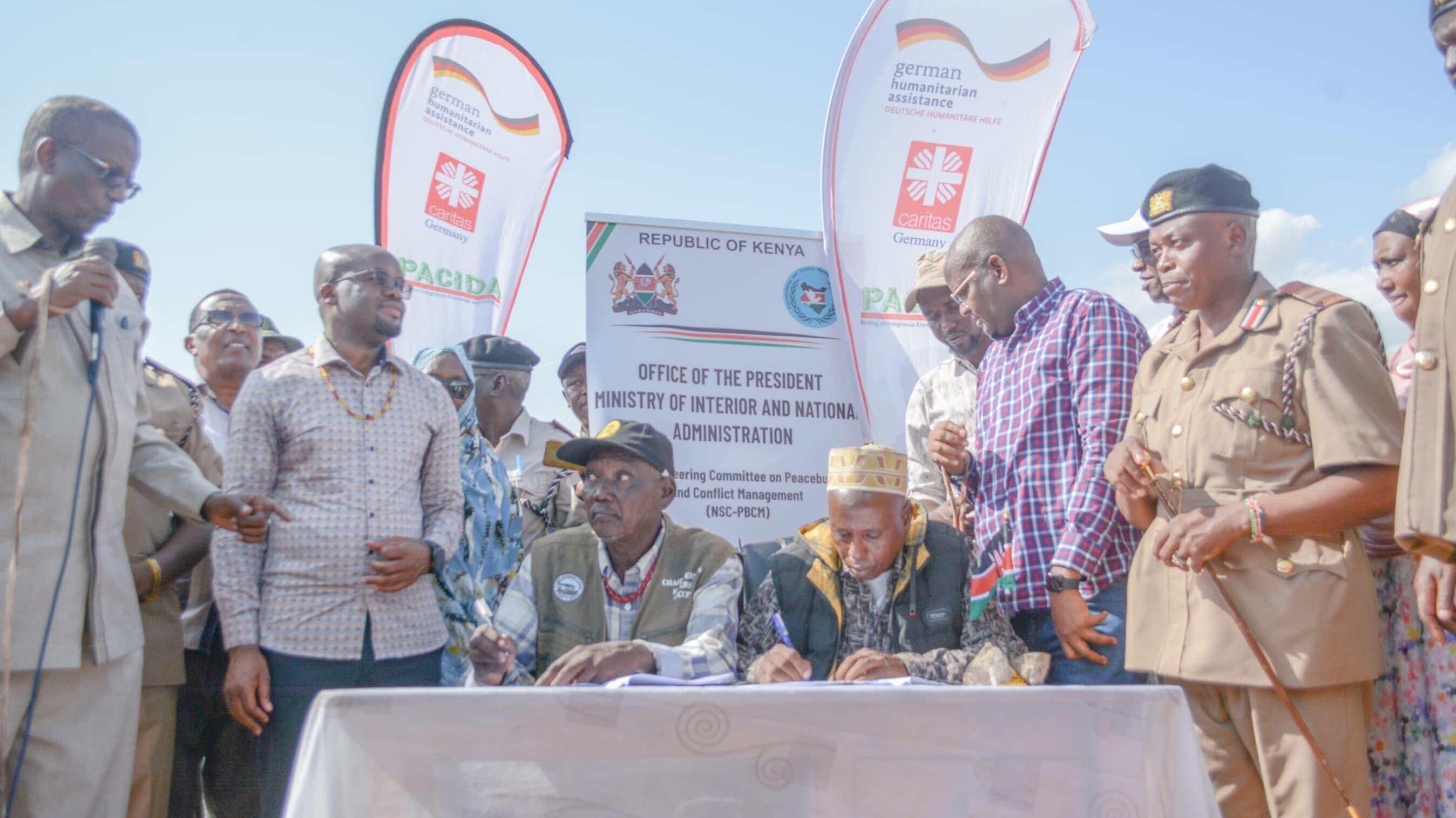Gabra, Dassanach communities sign historic peace accord in Marsabit

Members of the Gabra and Dassanach communities in Marsabit County signing a peace accord on July 2, 2025, signaling a new chapter in the pursuit of lasting harmony in Northern Kenya. The ceremony was presided over by Interior Principal Secretary Raymond Omllo. Photo/James Murimi
In a historic step toward ending decades of inter-communal hostilities, the Gabra and Dassanach communities have signed a peace accord, signaling a new chapter in the pursuit of lasting harmony in Northern Kenya.
The long-awaited agreement was inked on Wednesday in Illeret, North Horr Constituency, Marsabit County, near the Kenya-Ethiopia border.
The ceremony was witnessed by top officials from the Ministry of Interior and Coordination of National Government, civil society leaders, and community elders.
The accord seeks to end periodic violence and rivalry between the two(2) pastoralist groups, a relationship strained by cattle raids, territorial disputes, and political tensions since Kenya's independence.
Interior Principal Secretary Raymond Omollo, who presided over the event, urged the communities to move past their historical differences and embrace peaceful coexistence.
“We call on the Gabra and Dassanach to bury their past and build a future rooted in unity,” said Dr Omollo.
“There is no future in conflict, only in peace.”
He also reminded citizens of the importance of respecting the rule of law and encouraged them to use peaceful and legal avenues to address grievances.
The PS warned that those behind recent violent protests, particularly those linked to the Gen Z movement, would be held accountable.
“The government will take firm action against anyone who incites or engages in unlawful demonstrations,” he said.
Eastern Regional Commissioner Paul Rotich, who accompanied the PS, called on the communities to embrace education as a long-term solution to conflict and poverty.
“Education is the foundation of lasting peace. It empowers our children to choose dialogue over violence,” Mr Rotich stated.
North Horr MP Wario Ade praised the peace accord, saying improved security in the region had already unlocked development opportunities.
“Where peace exists, development follows. This agreement is the beginning of a better future for our people,” said the lawmaker.
Civil society leaders also played a key role in brokering the agreement.
The Chief Executive Officer (CEO) of the Pastoralists Community Initiative and Development Assistance (PACIDA) Patrick Katelo applauded local organisations and the Illeret Catholic Mission for facilitating the process over the last two(2) years.
“This accord sets the foundation for economic growth by reviving trade in fish and livestock, which had collapsed due to recurrent clashes,” Mr Katelo said.
He urged the government and local leadership to ensure equitable sharing of natural resources, especially in the face of climate change.
Chair of the Dassanach Peace Committee Mike Kesho described the agreement as a “breakthrough” for a region long plagued by suspicion and hostility.
“For the first time in decades, there is hope. We are grateful to all who walked this journey with us,” Mr Kesho said.
His Gabra counterpart, Mr Hero Elema, echoed the sentiment, noting that social relations between the two groups had already improved.
“We can now visit each other’s villages and even spend nights there. That was unthinkable just a few years ago,” Mr Elema said.
Fr Benedict Mukavi of the Illeret Catholic Mission called for deepening of the peace by encouraging intermarriage among the youth of the two communities.
“Intermarriage is a powerful symbol of unity and an assurance of lasting peace. We must now build on this momentum,” said Fr Mukavi.
As the dust settles on the historic signing, optimism is high that the Gabra-Dassanach accord will not only end hostilities, but also unlock new opportunities for trade, education, and sustainable development in Marsabit County and beyond.

Be the First to Comment